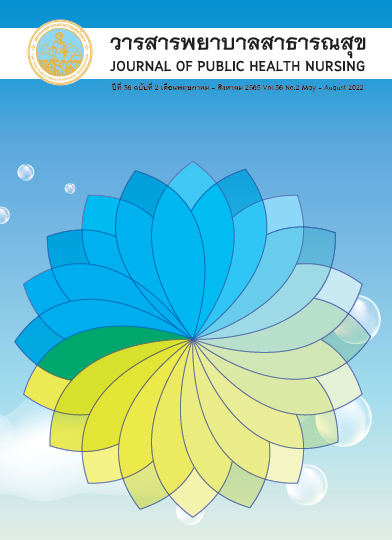Appropriate teaching model on home visit influencing academic achievement and learning outcomes according to the Higher Education Qualification Framework
Keywords:
Learning outcomes, The Qualification Framework, Teaching, Home visitsAbstract
This research is an experimental research. to study and compare learning achievement and learning outcomes according to the framework of qualifications in 6 areas before and after the experiment. The sample consisted of 65 nursing students in the 3rd year of a university in the academic year 2021. Purposive sampling was conducted. Teaching was carried out using a combination of teaching styles in 3 methods: descriptive teaching, demonstration teaching and teaching simulations Data were collected using quizzes and questionnaires. The data were analyzed by using statistics, percentage, mean, standard deviation and paired - sample t-test. The results showed that the students had higher learning achievement after the experiment than before the experiment. It was statistically significant at the .05 level (p = 0.00) and the learning outcomes according to the 6 qualification standard frameworks after the experiment were higher than before the experiment with statistical significance at the .05 level (p = 0.00). Based on the results of this research, the university should choose to use a variety of teaching styles as a framework for teaching nursing teaching by considering Lectures, demonstrations, and simulated teaching for nursing education were chosen as they were suitable formats that could develop nursing skills for students as well.
References
References
Khamanee T. Pedagogical Sciences and Knowledge for Effective Knowledge Process Management. Bangkok: Chulalongkorn University Press; 2014.
Khamanee T. 14 teaching methods for professional teachers. Bangkok: Chulalongkorn University Book Center; 2013.
Suwankhiri V, Chulamusi O, Tangkavanich T. Learning management using simulation for students Nursing students. JNSCU 2016; 28(2):1-14. (in Thai)
Sinthuchai S, Ubonwan K, Boonsilp S. The effect of situational learning management. Virtual simulation on knowledge Satisfaction and self-understanding among 4th year nursing students in practicing Practice professional skills training course before graduation. RNJ 2018; 23(1): 113-27. (in Thai)
Champakaew W. Development of learning achievements. Injury matters and first aid using management. Learn with a demonstration with mixed media. Grade 3 [Thesis]. Mahasarakham: Rajamangala University Phat Maha Sarakham; 2017
Kalptiwanich R. The effects of a blended learning with demonstration technique for practice training on building animation of computer graphic subject for mathayomsuksa 3 students at Princess sirindhorn's college. Veridian E-Journal, Silpakorn University (Humanities, Social Sciences and arts) 2013; 6(2): 642–54. (in Thai)
Maksorn N, Korbuakaew R. Design of learning activities with demonstration processes using online lesson about word processor for junior high school students. ITMI 2017; 4(2): 17–25. (in Thai)
Chaichuay A. Developing learning outcomes on counting and calculating the cost of inventories at the end of the period. Accounting by using demonstration teaching techniques to support the use of real media for students at the Vocational Level Year 2/1 Accounting Department For the first semester of the academic year 2017, ASEAN Technological College. Chiang Mai: Payap University Chiang Mai Province; 2017.
Tultham J, Tultham K. Learning management with a demonstration model to increase academic achievement Practical skills in the use of oscilloscopes bachelor’s degree in Computer Engineering, Thammasat University. RMUTI JOURNAL 2016; 3(2): 45–54. (in Thai)
Aebersold M. Simulation – Based Learning: No longer a Novelty in Undergraduate Education. Online J Issues Nurs 2018; 23(2). doi: 10.3912/OJIN.Vol23No02PPT39
Olga Chernikova, Nicole Heitymarn, Matthias Staden, Doris Holzberger, Tina Seidel, and Frank Fischer. Simulation–Based Learning in Higher Education: A Meta- Analysis. Rev Educ Res 2020; 90(4): 499-541.
Wutthirak A. Development of learning achievements. Regarding commercial registration of partnerships and limited companies Accounting process course for 2nd year vocational certificate (vocational certificate) students in accounting by learning simulation model Sintirat Vocational College under the patronage of His Majesty the King. Bangkok: Santirat Vocational College under the patronage of His Majesty, Chatuchak, Bangkok; 2014.
Srisawangwong P. Development of Learning Achievement towards the course of accounting for food business on accounting principles applied in food business of 2nd year students in food business and nutrition Maha Sarakham Rajabhat University By learning simulation model. Arts and Management Science 2018; 5(1):10–22. (in Thai)
Downloads
Published
How to Cite
Issue
Section
License
Copyright (c) 2022 Thai Public Health Nurses Association

This work is licensed under a Creative Commons Attribution-NonCommercial-NoDerivatives 4.0 International License.
บทความที่ตีพิมพ์และแผนภูมิรูปภาพถือเป็นลิขสิทธิ์ของวารสารพยาบาลสาธารณสุข (Thai Public Health Nurses Association)







